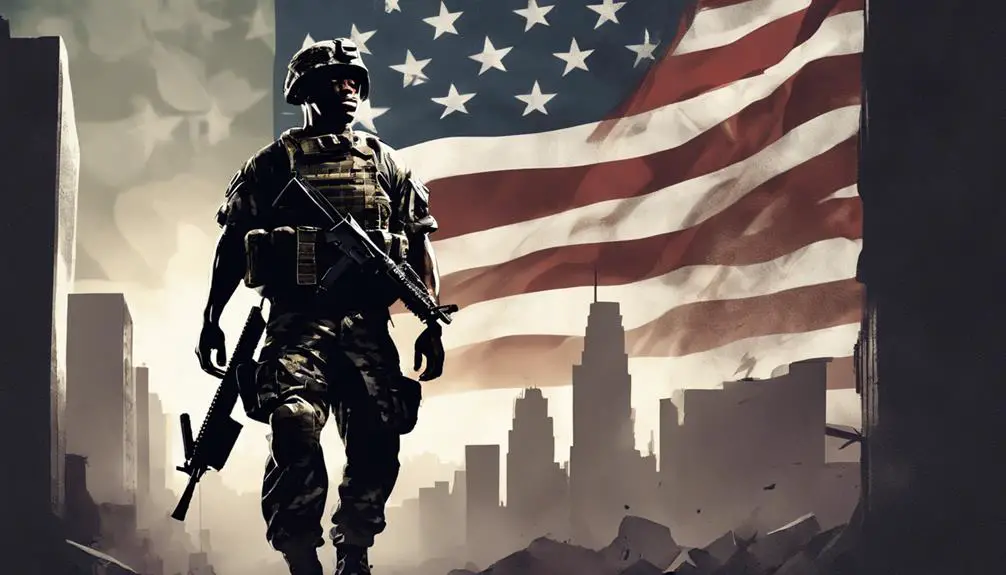As you explore Black military slang, you'll uncover a linguistic phenomenon shaped by the intersection of segregation, cultural identity, and wartime experience. Born in World War II, this slang emerged as a coping mechanism for soldiers, creating a sense of community and identity within segregated units. Through code-switching, soldiers navigated rank dynamics and maintained cultural fluency. In combat zones, this vernacular fostered camaraderie and coping mechanisms, establishing a collective identity for survival. As you dig deeper, you'll uncover the nuances of Black military slang, a powerful tool of resistance that challenged dominant culture and preserved cultural heritage.
Origins of Black Military Slang
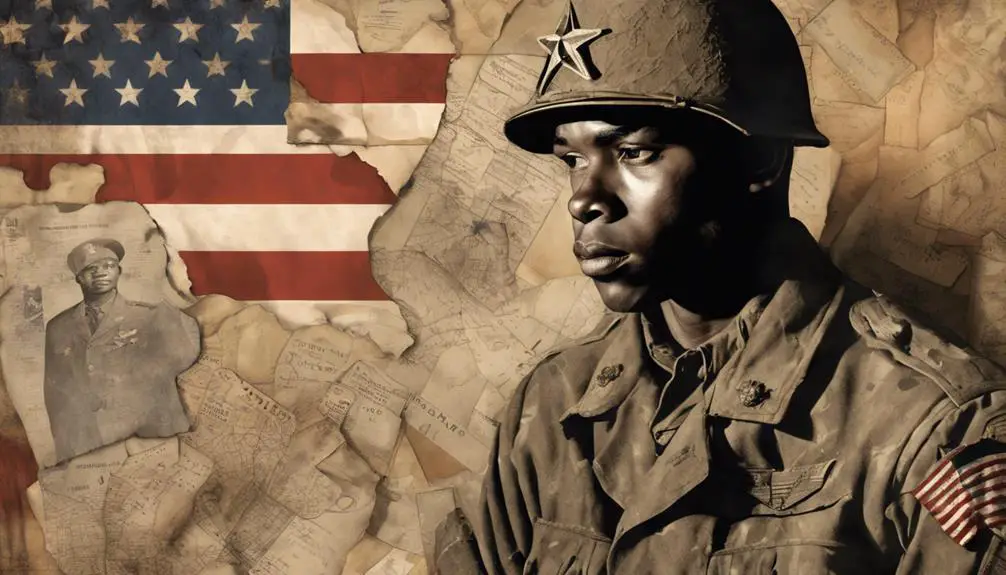
As you explore the history of black military slang, you'll notice that it was a direct result of the Linguistic Evolution that occurred in these segregated units. The Historical Context of World War II played a significant role in shaping this slang, as African American soldiers drew from their shared experiences, cultural background, and everyday conversations to create a distinct language.
You'll find that this slang wasn't only a means of communication but also a way to cope with the harsh realities of war. It was a way to express emotions, share experiences, and bond with fellow soldiers.
The Historical Context of segregation and racial tension also influenced the development of this slang, as African American soldiers sought to create a sense of community and identity within their units. As you investigate the origins of black military slang, you'll gain a deeper understanding of how language can be shaped by cultural heritage, historical events, and social context.
Code-Switching in the Ranks
As you traverse the complex social dynamics of segregated military units, you'll discover that code-switching – the intentional shift between standard military language and black military slang – was an essential tool for African American soldiers to negotiate their dual identities and maintain a sense of autonomy within the ranks.
Code-switching allowed them to move seamlessly between their individual identities as black Americans and their roles as soldiers, ensuring they could communicate effectively with fellow soldiers while maintaining cultural fluency. This linguistic dexterity was pivotal in navigating rank dynamics, where African American soldiers often found themselves caught between adhering to military protocol and asserting their cultural identity.
Black Vernacular in Combat Zones
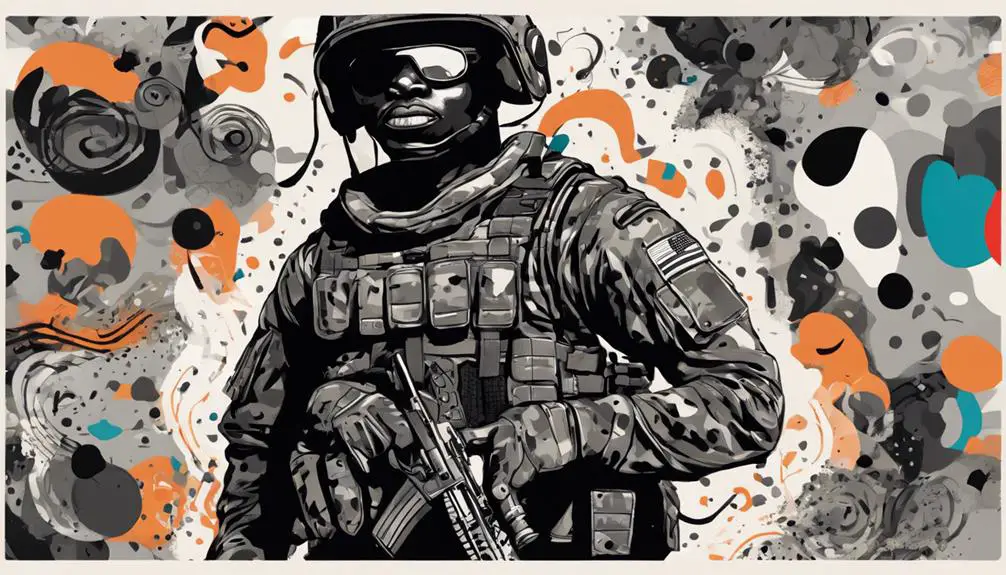
How did African American soldiers deploy black vernacular in combat zones, where the pressure to conform to standard military language was heightened, yet the need for cultural expression and solidarity remained essential for survival?
You might think that the intense environment of combat would suppress cultural expression, but that's not the case. In fact, black vernacular played an important role in fostering camaraderie and coping mechanisms among African American soldiers.
In combat zones, black vernacular enabled soldiers to create a sense of community and shared experience. It helped to establish a collective identity, which was necessary for survival in the face of adversity. This dialectical tension between conforming to standard military language and expressing cultural identity is what we call combat dialectics.
Encoding Identity Through Language
Through language, African American soldiers encoded their cultural identity, conveying nuances of their collective experience that standard military language couldn't capture. You, as a listener, can decipher the subtle cues embedded in their slang, revealing a rich tapestry of cultural signifiers. These linguistic nuances served as a means of self-identification, distinguishing themselves from their white counterparts. By exercising language autonomy, they reclaimed their cultural voice, resisting assimilation into the dominant military culture.
When you examine the language patterns, you'll notice a distinct fusion of African American Vernacular English (AAVE) with military jargon. This blending of linguistic codes enabled soldiers to convey complex emotions, ironic humor, and collective experiences unique to their community. Code-switching became a powerful tool, facilitating communication within their cultural enclave while maintaining a sense of exclusivity.
Slang as a Tool for Resistance
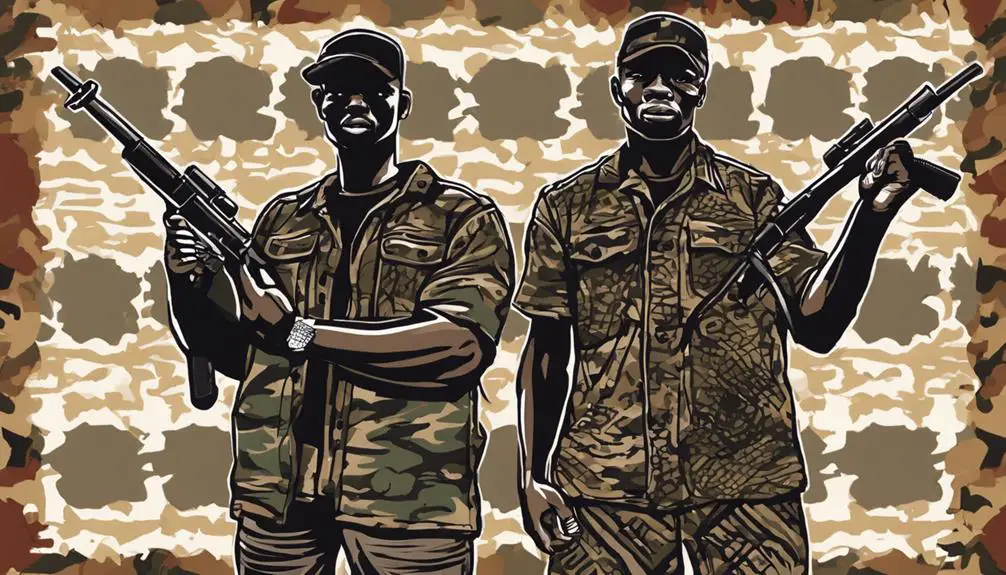
By exploring military jargon and infusing it with African American Vernacular English, Black soldiers transformed slang into a subversive tool, allowing them to subtly challenge the dominant military culture and assert their collective identity.
This linguistic fusion enabled them to create a counter narrative, one that countered the prevailing narratives of racial inferiority and oppression. Through their subversive language, they resisted the dehumanizing effects of military protocol and reclaimed their humanity.
As you investigate further, you'll notice that this slang served as a powerful tool for resistance. By using coded language, Black soldiers could communicate without being detected by their superiors. This secrecy allowed them to express their frustrations, share experiences, and even plan subtle acts of defiance.
Additionally, their slang functioned as a form of social commentary, critiquing the systemic racism and inequality they faced. By using language as a tool for resistance, Black soldiers were able to carve out spaces for self-expression, community-building, and collective empowerment.
Unspoken Rules of Black Camaraderie
As Black soldiers navigated the complexities of military life, they relied on an unwritten code of conduct that fostered a sense of brotherhood and mutual support, ultimately creating a safety net of camaraderie that helped them survive the challenges of military service.
You, as a Black soldier, understood that this code was vital to your well-being and the success of your unit. It was based on unspoken rules of respect, trust, and loyalty, which formed the foundation of strong bonds forged in the fire of shared experiences.
These bonds translated into squad goals, where teamwork and unity became the driving force behind your mission. You knew that your fellow Black soldiers had your back, and you'd do the same for them.
This sense of brotherhood wasn't limited to your immediate unit; it extended to the broader Black military community, creating a network of support that transcended rank and unit affiliations. By adhering to these unspoken rules, you ensured that you were part of a larger family that looked out for one another, both on and off duty.
Preserving Cultural Heritage in Uniform
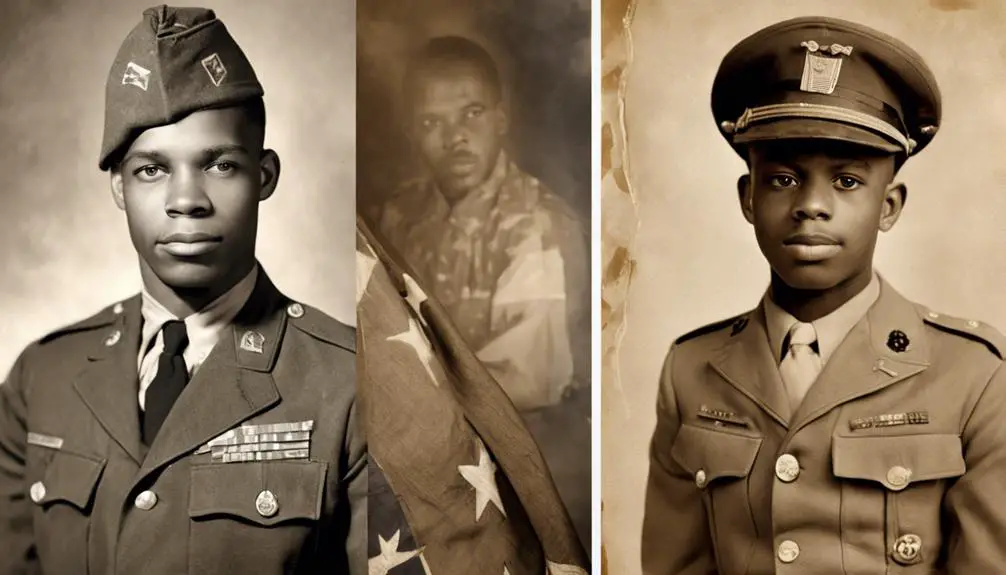
You wore your cultural heritage on your sleeve, literally, by incorporating subtle yet meaningful elements into your uniform, from African-inspired hairstyles to dashikis worn on special occasions, ensuring that your identity remained intact despite the uniformity of military attire.
As you navigated the complexities of military life, you understood the importance of Cultural Representation and Heritage Preservation. You knew that your presence in the military wasn't only a representation of yourself but also of your community. By subtly expressing your cultural identity, you were able to preserve your heritage and create a sense of belonging in an environment that often emphasized uniformity over individuality.
Here are three ways you preserved your cultural heritage in uniform:
- Incorporating African-inspired hairstyles: You wore hairstyles that reflected your cultural roots, such as braids, twists, or Afros, which not only expressed your individuality but also connected you to your heritage.
- Wearing cultural attire on special occasions: You wore dashikis, kente cloth, or other cultural attire on special occasions, such as cultural events or holidays, to showcase your heritage and connect with your roots.
- Displaying cultural symbols: You displayed cultural symbols, such as African-inspired jewelry or accessories, which served as a subtle yet powerful expression of your cultural identity.
Frequently Asked Questions
Do Black Soldiers Only Use Slang in Informal Settings?
You might think that slang is only used in casual, relaxed environments, but that's not entirely true. In reality, you'll find that slang can seep into formal settings, making it a Formal Exception.
Even in professional contexts, like the military, soldiers use slang as a Private Code to quickly communicate complex ideas or share inside jokes. So, no, soldiers don't only use slang in informal settings; it's a linguistic tool that adapts to various environments.
How Does Military Slang Impact Black Identity Outside Service?
As you venture beyond the military gates, you carry a unique dialect that's woven into your cultural fabric. Outside the service, military slang can shape your identity, influencing how you express yourself and connect with others.
It's a form of cultural expression, where code-switching becomes a survival skill. Your language becomes a reflection of your identity formation, blending military nuances with civilian life.
Can White Soldiers Use Black Military Slang Without Offense?
When you use slang from another culture, you're walking a fine line. Without proper understanding and respect, it can come across as cultural appropriation.
You need to recognize your language privilege and be mindful of the power dynamics at play. Using black military slang without being black or having a deep understanding of its origins can be offensive.
Take the time to learn, reflect, and be honest with yourself: are you borrowing or stealing?
Are There Regional Differences in Black Military Slang Usage?
You're wondering if regional differences exist in military slang usage. Let's break it down.
Imagine a map, with dialects scattered across it like puzzle pieces. Geo dialects, shaped by cultural influences, emerge.
In the South, you might hear 'y'all' instead of 'you guys.' In the North, 'wicked' means 'very.' These variations exist, reflecting local flavors.
When you superimpose this onto black military slang, it's likely that regional differences will arise, influenced by the cultural melting pot of the military.
Do Black Military Slang Terms Change Over Time or Stay Consistent?
You might wonder if slang terms change over time or stay consistent.
In general, slang is known to evolve with cultural evolution, reflecting the dynamic nature of language. As cultural trends shift, slang often adapts, with old terms falling out of favor and new ones emerging.
However, it's possible for slang to experience a revival, where classic terms regain popularity.
In the context of Black Military Slang, understanding these patterns can provide valuable insights into the cultural landscape of the military community.
Conclusion
As you stand in formation, the hum of cadences and the rustle of uniforms blur into the background, and you're transported to a world where 'fam' and 'G' replace rank and serial number.
In this dual reality, the drill sergeant's barks are tempered by the whispered 'aye, aight' of camaraderie. Amidst the rigid hierarchy, black military slang thrives, a liberating counterpoint to the uniformity of war, where cultural heritage and resistance simmer beneath the surface, waiting to be decoded.

